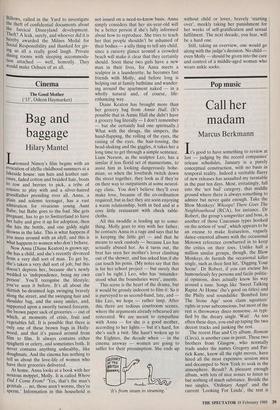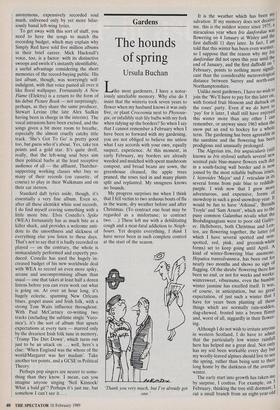Pop music
Call her madam
Marcus Berkmann
It's good to have something to review at last — judging by the record companies' release schedules, January is a purely conceptual construction, with no basis in temporal reality. Indeed a veritable flurry of new releases has assaulted my turntable in the past ten days. Most, irritatingly, fall into the 'not bad' category, that middle ground where there is always something to admire but never quite enough. Take the Blow Monkeys' Whoops! There Goes The Neighbourhood (RCA), for instance. Dr Robert, the group's songwriter and boss, is another of those Caucasian types hooked on the notion of 'soul', which appears to be an excuse to make featureless, vaguely dance-oriented albums with the occasional Motown reference crowbarred in to keep the critics on their toes. Unlike half a million similar groups, though, the Blow Monkeys do furnish the occasional killer single, such as their first hit, 'Digging Your Scene'. Dr Robert, if you can excuse his humourlessly fey persona and facile politic- al opinions, does actually know his way around a tune. Songs like 'Sweet Talking Rapist At Home' (he's good on titles) and the Philly soul soundalike 'Bombed Into The Stone Age' soon claim squatters' rights in your subconscious, but most of the rest is throwaway disco nonsense, as typi- fied by the dreary single 'Wait'. As too often these days, you end up taping the two decent tracks and junking the rest. The recent Hue and Cry album, Remote (Circa), is another case in point. These two brothers from Glasgow, who normally trade under the names Gregory and Pat- rick Kane, know all the right moves, have hired all the most expensive session men and decamped to New York to soak in the atmosphere. Result? A pleasant enough album, with lots of nice noises to listen to but nothing of much substance. Beside the two singles, 'Ordinary Angel' and the current 'Looking For Linda', the rest is
anonymous, expensively recorded soul mush, enlivened only by yet more hilar- iously banal left-wing lyrics.
To get away with this sort of stuff, you need to have the songs to match the recording budget, which may explain why Simply Red have sold five million albums in their brief career. Mick Hucknall's voice, too, is a factor: with its distinctive swoops and swirls it's instantly identifiable, a useful advantage considering the short memories of the record-buying public. His last album, though, was worryingly self- indulgent, with that voice pasted all over it like floral wallpaper. Fortunately A New Flame (Elektra) is a return to the form of his debut Picture Book — not surprisingly, perhaps, as they share the same producer, Stewart Levine (the late Alex Sadkin having been in charge in the interim). The vocal intrusions have been excised, and the songs given a bit more room to breathe, especially the almost cruelly catchy title track. 'She's Got To Go' is pretty good too, but guess who it's about. Yes, take ten points and a gold star. It's quite droll, really, that the left-wing soul boys aim their political barbs at the least receptive audience of all — the affluent, Thatcher- supporting working classes who buy so many of their records (on cassette, of course) to play in their Walkmans and on their car stereos.
Standard daft lyrics aside, though, it's essentially a very fine album. Even so, after all these identikit white soul records, I do find myself craving something with a little more bite. Elvis Costello's Spike (WEA) fortunately has as much bite as a killer shark, and provides a welcome anti- dote to the smoothness and slickness of everything else you listen to these days. That's not to say that it is badly recorded or played — on the contrary, the whole is immaculately performed and expertly pro- duced. Costello has used the hugely in- creased budget of his new worldwide deal with WEA to record an even more spiky, arcane and uncompromising album than usual — one that takes at least half a dozen listens before you can even work out what is going on. At over an hour long, it's hugely eclectic, spanning New Orleans blues, gospel music and Irish folk, with a strong Tom Waits influence throughout. With Paul McCartney co-writing two tracks (including the sublime single 'Vero- nica'), it's the sort of album that upsets expectations at every turn — marred only by the dreariest Irish folk tune in memory, `Tramp The Dirt Down', which turns out just to be an attack on ... well, here's a clue: `When England was the whore of the world/Margaret was her madam'. Take another ten points, and a GCSE in Political Theory.
Perhaps pop singers are nearer to some- thing than they know. I mean, can you imagine anyone singing `Neil Kinnock/ What a bald git'? Perhaps it's just me, but somehow I can't see it....



















































 Previous page
Previous page